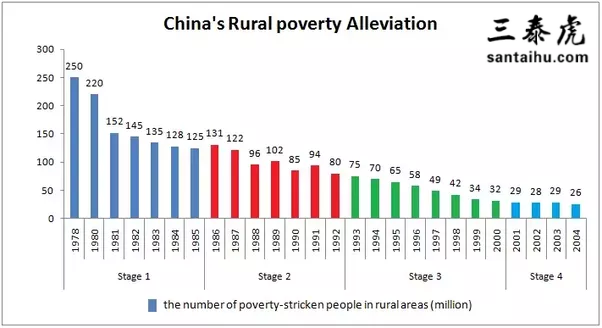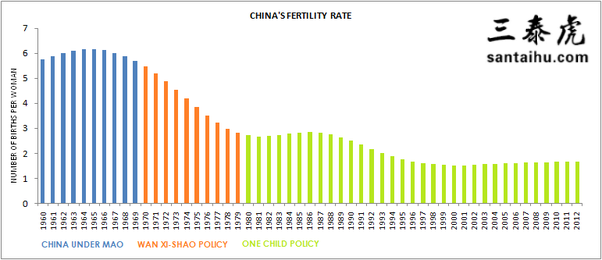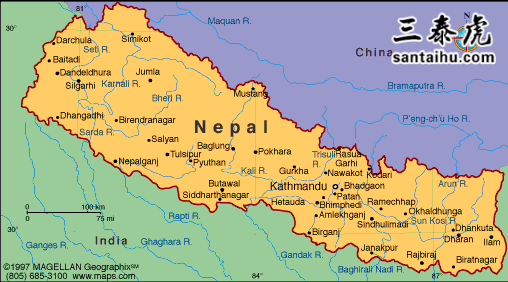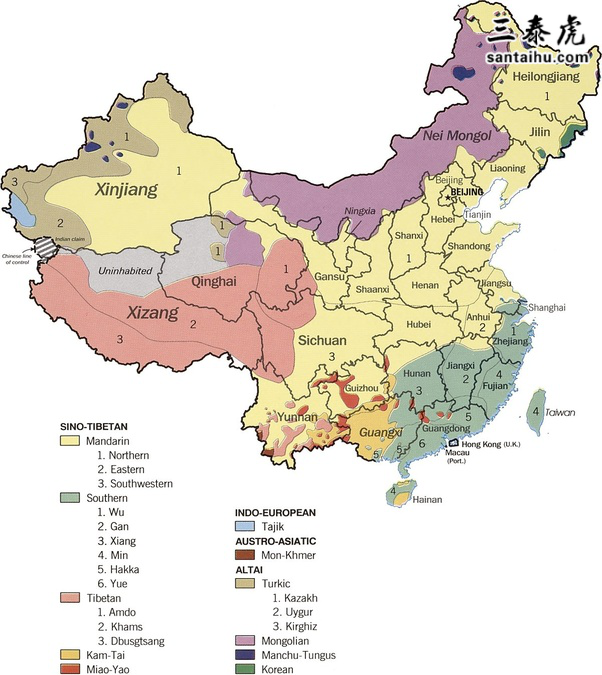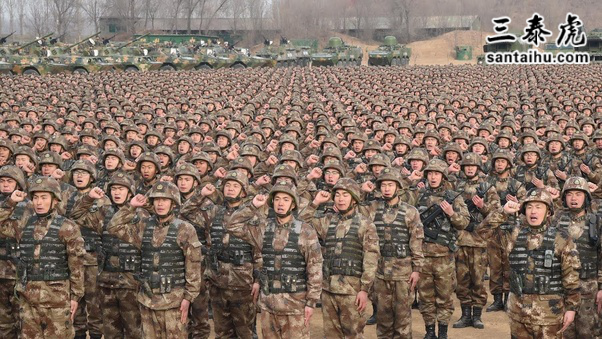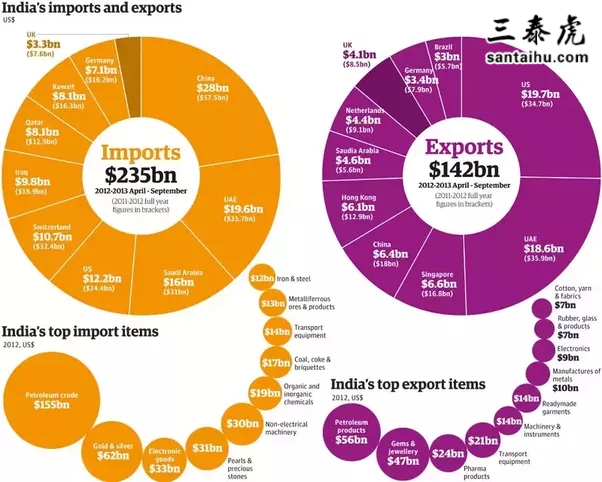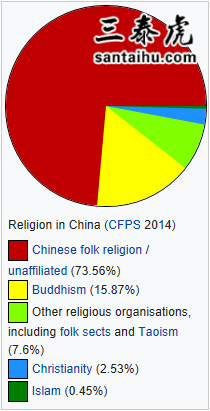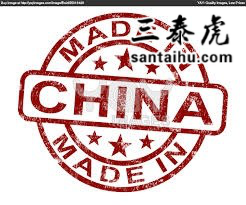印网友热议: 印度人对中国存在哪些误解
What are the common misconceptions Indians hold about China?印度人对中国存在哪些普遍误解?Quora评论翻译:来源:三泰虎 http://w
What are the common misconceptions Indians hold about China?
印度人对中国存在哪些普遍误解?
Quora评论翻译:
来源:三泰虎 http://www.santaihu.com/46201.html 译者:Jessica.Wu
Vanita Ashar
Yes! There are misconceptions about China Indians hold. I'll list here two for now.
是的,印度人对中国有误解。我在这里列出两点:
- That poverty reduction followed economic growth in China.
For example: In a recent interview a famous political leader, citing the example of China, he said:
"The Asian country grew by about 9% on an average for over three decades and reached where it is today."
"I think if we continue at that rate of growth over the next 10 years we would have substantially created a better infrastructure and brought down poverty rates at a faster pace."
The historic details discussed in Vanita Ashar's answer to What did China do but India hasn't that brought a billion people out of poverty? explains how China had already managed to dramatically bring down its rural poverty even before growth started to accelerate in the 90s.
Here are some statistics (taken from above answer) which are self exemplary.
- 中国的经济增长之后,贫困人口才开始减少。
例如:在最近的一次采访中,一位著名的政治领导人引用了中国的例子,他说:“这个亚洲国家过去30年的平均增长率达9%,达到了今天的水平。我认为,如果我们在未来10年继续保持这种增长速度,我们就会大大改善基础设施,并加快降低贫困率。”
Vanita Asha在回答“中国做了哪些印度没有做的事情,才让十亿人脱离贫困?”这一问题时讨论的历史细节,解释了在90年代经济增长开始加速之前,中国如何成功大幅降低了农村贫困率。
下面是一些统计数据(摘自以上回答):
- That population of China was mostly brought under control due to China's one child policy.
This is a misconception many, not only Indians, have about China.
The historic details discussed in Vanita Ashar's answer to How could China achieve population control so fast but India could not? explains how China had already managed to dramatically bring down its fertility rate even before the one-child policy was introduced in 1979.
Here are some statistics (taken from above answer) which are self exemplary.
- 由于独生子女政策,中国人口基本上得到了控制。
不仅是印度人,还有很多人都对这一点存在误解。
Vanita Ashar在回答“中国如何迅速实现控制人口增长,而印度却没有做到?”这一问题时讨论的历史细节,解释了中国如何在1979年实行计划生育政策之前就已经成功大幅降低了生育率。
以下是一些统计数据(摘自上面的答案):
Satpal Parmar, studied Computer Science at Kurukshetra University
Average Indian is not aware enough to make any educated opinion on China so I am not sure what misconceptions you are talking about. Indian politicians & media have done an amazing disservice in educating general public about their rising neighbor. Whatever we know about about China either coming from outdated Indian history books or through hyper sensitive western press.
普通印度人对中国没有足够的了解,所以我不确定你所说的误解是什么。在教导公众认识他们崛起中的邻国方面,印度政客和媒体却令人惊奇的帮了倒忙。我们对中国的了解要么来自过时的印度史书,要么来自超级敏感的西方媒体。
Here is what I think Avg. Indian think of China according to me:
在我看来,普通印度人对中国的看法包括以下几点:
- Indian and China are two of the oldest living civilization of the world. We shared good relationship in past. China betrayed us post Independence and tried to invade India. We lost some territory in the subsequent war. China is still claiming Indian territory in Arunachal Pradesh.
印度和中国是世界上最古老的文明,我们过去的关系很好。独立后,中国背叛我们,入侵印度。在随后的战争中我们失去了一些领土。中国仍然声称对印度在“阿邦”的领土拥有主权。
- Every man and his dog is claiming China as next superpower though nobody seems to have any idea what that exactly it means for world or India.
每个人都宣称中国是下一个超级大国,然而似乎没有人知道这对世界或印度意味着什么。
- Indian software engineers who have worked with Chinese developers think Chinese are much more hardworking & disciplined in their work. They are 'more' willing to slog but at times suffer with group-think.
曾与中国开发商合作过的印度软件工程师认为,中国人在工作中更加勤奋和自律。他们“更愿意”埋头苦干,但有时也会因为群体思维而感到痛苦。
- Very few Indian have traveled to China. Those who have, have not gone beyond industrial cities like Beijing or Shanghai. From their experiences they have concluded that Indian democratic decision-making is a failure and China is 20 years ahead of India in economic development.
很少有印度人去过中国。那些去过的,也只到过北京或上海这样的工业城市。根据这些经历,他们得出的结论是,印度的敏煮决策是失败的,而中国在经济发展方面领先印度20年。
- Culturally China is supposedly a suppressed society. They read & write what the govt approves of. Most of us have no idea how true is this fact or what impacts it has on the daily life of average Chinese citizen.
在文化上,一般认为中国是个受压制的国家。他们读书或者写作都要经过政府的批准。而我们大多数人都不知道这一点是否真的属实,或者这对普通中国公民的日常生活有多大影响。
- Most have absolutely no idea if rising China is a opportunity or threat. Indian foreign policy & media is deliberately equivocal about the whole issue.
大多数人完全不知道崛起的中国对我们来说是机遇还是威胁。印度的外交政策和媒体在整个问题上故意模棱两可。
- Cheap (and sometimes inferior) Chinese products are flooding Indian markets. While this is giving sleepless nights to some local manufacturers others are happy selling inferior Chinese labels at a premium.
廉价(有时低劣)的中国产品充斥着印度市场。尽管这让一些本土制造商夜不能寐,但也有一些制造商乐于高价出售劣质的中国商品。
- Most of us have no plans to teach Mandarin to our kids. Most don't even know there is language called Mandarin.
大多数人都不打算教孩子中文。大多数人甚至不知道有一种语言叫普通话。
- Most of us cannot differentiate a Chinese from a Korean or a Japanese. All are chinki.
大多数人无法区分中国人、韩国人和日本人,他们都是中国佬。。
- As far as cultural influence goes we love Bruce Lee tattoos & T-shirts , eating Hakka noddles & watching Jackie Chan movies.
就文化影响而言,我们喜欢李小龙的纹身和T恤,爱吃客家面,爱看成龙的电影。
Does this list include any of the common misconceptions you were referring to?
上述有没有你所说的普遍误解?
Harshil Mehta, Lives in India
There are many common misconceptions Indians hold about china. I am not telling about the knowledgeable people and people who visited china; I am writing opinion of the common and average Indian.
印度人对中国有很多普遍误解。我所说的不是那些有学识的人和去过中国的人;我这里说的是普通印度人的观点。
Nepal is part of China. In our Gujarat, many people from Nepal come here and work. Most of the people consider themselves as Chinese people. It is due to something face similarity between nepalese and chinese. (Sometimes, people from north east India is also considered as chinese.) So, here is a map of Nepal. North side is china and south side is India. Actually, Nepal and china are different.
尼泊尔是中国的一部分。在古吉拉特邦,许多尼泊尔人来到这里工作,他们中的大多数人都自认为是中国人。这是因为尼泊尔人和中国人长相有一些相似之处。(有时候,来自印度东北部的人也被认为是中国人。)这是一幅尼泊尔地图。北面是中国,南面是印度。事实上,尼泊尔和中国是两回事。
China has only chinese language. This is also one type of misconception. China has its official language as Mandarin which we consider as chinese. The languages most studied and supported by china include Chinese, Mongolian, Tibetan, Uyghur and Zhuang. China has 299 living languages listed at Ethnologue.
中国只有汉语这一种语言,这也是一种误解。中国的官方语言是普通话,我们视之为汉语。在中国,受到广泛研究和支持的语言包括汉语、蒙古语、藏语、维吾尔语和壮语。中国现存299种民族语言。
Chinese Military can attack and occupy the India at any time. In India, chinese military i.e. people liberation force is slightly overrated due to media. Of course, china has strong army but not that much strong to occupy the whole India. China has more population and land than India. So, it is obvious that they have strong army.
中国军方可以随时攻击并占领印度。在印度,由于媒体的报道,中国军队,也就是人民解放军被高估了。当然,中国有强大的军队,但不足以占领整个印度。中国的人口和土地都比印度多。所以,他们显然有强大的军队。
Chinese people eat only noodles. Here, Noodles are seen as only chinese food. But chinese people don’t eat only noodles they have some items made up of wheat, vegetables, soya bean, rice etc.
中国人只吃面条。在印度,面条被视为唯一的中国食物。但中国人不只吃面条,他们也吃小麦、蔬菜、大豆、大米等等。
Chinese economy is dependent on India. They exports their all products to India. This is total lie. India imports it’s 15.8% trade from china which means china exports their 3% trade to India. Chinese economy is much bigger than India. India is not their main business partner.
中国经济依赖于印度,他们把所有产品都出口到印度,这完全是谎言。印度15%的进口来自中国,这意味着中国3%的出口流向印度。中国的经济规模比印度大得多。印度不是他们的主要商业伙伴。
ŸAll people in china follows buddhism. Only 15.87% people of the china follows the buddhism. 73.56% of their people follows their folk religion which includes local religion, confucianism, taoism etc. China is religiously and culturally much diverse country.
所有中国人都信奉佛教。只有15.87%的中国人信奉佛教,73.56%的中国人信奉民间宗教,包括地方宗教、儒教、道教等。中国是一个宗教和文化多元化的国家。
These are the common misconceptions about china in India and reality about china. China and India had friendship of more than 2500 years and it should remain forever.
以上是印度对中国的普遍误解,也是中国的现实。中印友谊超过2500年,而且应该永远持续下去。
Prasanth Valsan K, Malayali, Beef Lover, Hindu, Loves to read and Travel. Now In Eastern Europe!
I will list a few:
我将列举一些误解:
Misconception: China is a monolithic nation with one language, one culture, one ethnic group etc
Reality:
China is a very diverse nation.
The ethnic Chinese (Hans) make up the majority with about a billion people. They predominantly live in the Eastern and south eastern provinces. They speak Chinese which is NOT one language but a collection of different languages (just like Hindi is not one language). Some of the Chinese dialects include Mandarin, Yue, Wu and Min. However, unlike the different strains of Hindi, these strains are mutually unintelligible. For example a person speaking Min dialect will not understand anything of the Yue dialect and so on. The official language of the government is Standard Chinese (Mandarin spoken in and around Beijing).
Ethnic Mongols live in the North central provinces of China. They are predominantly pastoral people and speak Mongolian which is written in the Cyrillic script (Russian alphabets).
误解一:中国是一个单一的语言、文化、民族等等
现实:中国是一个非常多元化的国家。
汉族占大多数,大约有10亿人口。他们主要居住在东部和东南部省份。他们所说的汉语不是一种语言,而是包含多种语言(就像印地语不是一种语言一样)。汉语的一些方言包括普通话、粤语、吴语和闽南语。然而,与印地语不同的是,这些方言彼此都无法沟通。例如,说闽南话的人听不懂粤语等等。政府的官方语言是标准汉语(在北京及周边地区使用普通话)。
蒙古族居住在中国的中北部省份。他们主要是游牧民族,说的是蒙古语,书写体是西里尔字母(俄罗斯字母)。
Misconception:
Under One Child Norm all Chinese people could have only one child
Reality:
The one child policy applied only to the Han Chinese. Even here it was not absolute. For example, in the rural areas, if the first child is a girl, the parents can have another child. In the urban areas, couples can have a second child if both of them are single children of their parents and so on.
误解二:在独生子女政策下,所有中国人都只能生一个孩子。
现实:独生子女政策只适用于汉人,这也不是绝对的,例如,在农村地区,如果第一个孩子是女孩,那父母还可以再生一个。在城市地区,如果夫妻双方都是独生子女,那他们就可以生二胎。
Misconception: China is very prosperous and all Chinese have lavish urban lifestyles.
Reality:
They only show pictures of Shanghai, Beijing and the industries. Central and Western China are similar to rural India. There are bad roads, power cuts, lack of potable water and government apathy. Female foeticide also exists in these parts because poor parents prefer male child (it is better to have one boy rather than one girl and a boy). Due to female foeticide, it is estimated that China has an excess of 60 million men. In India it is around 40 million.
Yes the per capita GDP of China is twice that of India, but it is still 10 times lesser than Japan. So China still has a long way to go.
误解三:中国非常繁荣,所有中国人都享受奢侈浪费的城市生活方式。
现实:中国只展示了上海、北京和工业地区的照片。中国中西部地区与印度农村相似。那里的道路坑坑洼洼、停电、缺乏饮用水。在这些地区也存在女婴堕胎的现象,贫穷的父母更喜欢男孩(最好是生一个男孩,而不是一男一女)。由于女婴流产,据估计中国的男性要多出6000万,而印度大约是4000万。中国的人均GDP是印度的两倍,但仍比日本低10倍。因此,中国仍有很长的路要走。
Misconception:
Chinese can invade and occupy India anytime.
Reality:
India and China really have very little scope for direct confrontation or power projection. The Chinese core, where the Han majority lives is well protected by the dense jungles to the South, the Tibetan highlands (a plateau located at an altitude higher than the Swiss Alps), the deserts in Mogolia and the Xinjiang provice. India is also isolated from China due to these very barriers and of course the Himalayas. So it will be foolishness on either side to implement a full scale land invasion to the other side. So both nations uses proxies to needle the other.
China uses Pakistan, Maoists and the North Eastern rebels.
India uses Vietnam, Tibet, Bhutan and Nepal.
Sri Lanka just plays hard to get to both these countries!
误解四::中国人可以随时入侵和占领印度。
现实:印度和中国真的没有多少直接对抗或投射实力的空间。汉人居住的中国核心地区被南部茂密的丛林、西藏高原(海拔比瑞士阿尔卑斯山还高的高原)、莫戈里亚沙漠和新疆地区保护得很好。由于这些屏障,当然还有喜马拉雅山,印度与中国被隔离开来。因此,任何一方对另一方实施全面的土地入侵都是愚蠢的。因此,两国都使用代理人来刺激对方。
中国利用巴基斯坦、毛派和东北叛军。
印度使用越南、西藏、不丹和尼泊尔。
斯里兰卡对两边都是做出一副欲情故纵的样子!
Misconception:
The Chinese military is much stronger than India's military
Reality:
Chinese power is overestimated. Yes, they have more equipment than us and a bigger budget. But they have quite a few handicaps.
Most of us know about the 1962 war with China. But not a lot know about the Chola Incident which happened in Sikkim in 1967. The Indian army scored a decisive victory over the Chinese in this limited war.
The Chinese Navy has no actual war experience where as our Navy has taken part in at least 2 wars.
误解五:中国军队比印度军队强大得多
现实:中国的实力被高估了。是的,他们的设备比我们多,预算也比我们多。但他们有相当多的障碍。
我们大多数人都知道1962年中印战争。但对1967年发生在锡金的朱罗事件了解不多。在这场有限的战争中,印度军队取得了决定性的胜利。
中国海军没有实战经验,而我们的海军至少参加过两次战争。
Misconception:
China will replace the US as the next superpower.
Reality:
Unless the US does something extremely stupid, there is going to be no challenge to its hegemony in the world in this century. No nation is going to challenge the US in this century. China will be an economic power but not a military superpower like the US. The reasons are many:
1 The US has no real challenge in the North and South American continents. China is surrounded by regional power- Japan, Russia, India, South Korea etc.
2 The US does not have border disputes with any of its neighbors. For example- It does not have to spend billions of dollars to protect an island from Canadian occupation! China has border disputes with ALL its neighbors- Japan (Senkaku Islands), India (Kashmir and Arunachal Pradesh), the Phillippines (Spratly Islands) and so on. The US can easily align with any of these powers to contain China. China has no such leverage in the American backyard.
3 The US has no secessionist movement within its borders. China has to spend billions of dollars just to keep itself united.
误解六:中国将取代美国成为下一个超级大国。
现实:除非美国做出极其愚蠢的事情,否则本世纪美国在世界上的霸权不会受到任何挑战。本世纪没有一个国家能挑战美国。中国将成为一个经济大国,而不是美国那样的军事超级大国。原因有很多:
美国在北美和南美大陆没有真正的挑战。中国被日本、俄罗斯、印度、韩国等地区大国所包围。美国与任何邻国都不存在边界争端。例如,美国不必花费数十亿美元来保护一个岛屿免受加拿大的占领! 中国与所有邻国都存在边界纠纷——日本(尖阁诸岛)、印度(克什米尔和“阿邦”)、菲律宾(南沙群岛)等等。美国可以很容易地与这些大国中的任何一个结盟,以遏制中国。中国在美国后院没有这样的影响力。美国境内没有分裂主义运动。为了维持统一,中国不得不花费数十亿美元。
Gaurav Gupta
While there was a time when fear was the dominant feature of the lives of Chinese people, the reality in China today is quite different. people today have many choices that were not available to them 10 or 15 years ago: choosing majors and jobs, buying homes and cars, and traveling abroad, for example. It's also important to remember that people in China are very patriotic, and they love their country deeply.
曾经有一段时间,恐惧是中国人生活的主要特征,但如今中国的现实却大不相同。如今的人们有许多10年或15年前没有的选择:比如选择专业和工作,购买房产和汽车,以及出国旅行。记住这一点也很重要,中国人非常爱国,他们深爱自己的国家。
Jay Bhatt, lived in China
TL;DR: Indians and Chinese are exactly the same, but don't know it and dislike each other.
I am an American-born Indian, so Satpal Parmar's answer above is way more appropriate, however I'd like to add this: Indian people and Chinese people are basically the same, except they don't like each other (see the comment about China occupying India in Satpal's answer. I hear this shit all the time from the older people in my family). Maybe there's some kind of competition for Most Awesome Ancient Civilization Still Existing that I don't know about. I base this observation on two things:
- a) all my friends from college, like me, are American-born Asians and most of the things they heard, grew up with, put up with, etc. were exactly the same as me.
- b) Having been in China for six weeks doing home stays with Chinese families, they often ask, "Do Americans do/say/think X." I always have to give 2.5 answers:
1) "Well, most Americans are like..."
2) "But since my family is from India, we..." At this point I always get the knowing smile and nod of approval, followed by some kind of statement like, "Yes, Chinese people are the same."
2.5) "And whenever I'm with my Asian friends, we also do X Asian/Indian style," followed by more nods of approval.
印度人和中国人完全一样,但他们都不知道这一点,也不喜欢对方。
我是一个在美国出生的印度人,所以Satpal Parmar的回答更合适,但是我想补充一点:印度人和中国人基本上是一样的,只是他们不喜欢对方。也许在争当“现存最令人敬畏的古代文明”。我的观察基于两点:
a)我大学时所有的朋友,像我一样,都是在美国出生的亚洲人,他们听到的大多数事情都和我一模一样。
b)在中国和中国家庭呆了六周后,他们经常问:“美国人做/说/想XX吗?”我总是要给出2个半回答:
1)“嗯,大多数美国人喜欢……”
2)“但因为我家来自印度,我们……”在这一点上,我总是得到会心的微笑和点头的肯定,然后说到“是的,中国人也是这样的。”
2.5)“每当我和我的亚洲朋友在一起的时候,我们也会按照亚洲/印度方式...”接着会得到更多的赞同。
Anonymous
That China took undue advantage of the benign policies towards it and waged a war on India. However , this is not entirely true.
Indian diplomatic stand was poor at best . Nehru's just couldn't see it coming .
THE TRUTH ABOUT 1962
中国过度利用印度对其的温和政策,对印度发动了战争。然而,这并不完全正确。
印度的外交立场往好了说是糟糕的,尼赫鲁根本不知道会发生什么。
1962年的真相
Arshad Barkaati, Citizen of India
Chinese are well versed in duplicating the products.
If any electronic product say "manufactured in china" will certainly have short life.No product of china will have warranty or guarantee.
Chinese are succesful only because they depend upon their own language.(They do not lay emphasis on english).
Every product from china is exceptionally cheap and no other country can manufacture it at such low cost.
1.中国人很会抄袭产品。
2.“中国制造”的电子产品,使用寿命肯定短。
3.中国的产品都没有保修或保障。
4.中文之所以成功,只是因为他们依赖自己的语言。(他们不重视英语)。
5.中国的每种产品都特别便宜,其他国家生产不出这么便宜的产品。
Deepan RP, works at CSS Corp
Originally Answered: What are the biggest misconceptions that Indians have about China?
That all the electronic products from china have low quality. And cannot be used for longer time.
That all the Korean mobiles are made in china. :P
"Made in China"
所有来自中国的电子产品质量都很差,而且不耐用。
所有的韩国手机都是在中国生产的。
“中国制造”
Terra Renee, US woman living in Chennai.
Originally Answered: What misconceptions about China do Indians have?
That all chinese people look the same and speak the same language, as well as that they all know martial arts. And that Chan and Wang are the names of 90% of chinese people (this is a very common name, but it's like 'Smith' for westerners). At least that's what I've found.
所有中国人看起来都一样,说着同样的语言,他们都懂武术。90%中国人的姓氏是王和陈(这是一个很常见的姓氏,对西方人来说就像“史密斯”一样)。我所发现的误解就这些。
Hemanshu Desai, 11 answers with 10 or more upvotes
Indians think China makes low quality products but if this were true, so much manufacturing would not be happening in China. The truth is, China makes products of all qualities. The cheapest ones are no doubt low quality.
Indians think China is poor like India but this is no longer true.
印度人认为中国制造的产品质量很差,但如果这是真的,那中国就不会有这么庞大的制造业。事实是,中国制造的各种品质的产品 。最便宜的无疑是低质量的。
印度人认为中国和印度一样贫穷,但这已不再是事实。
Ishani Gupta, Computer Scientist | Confused Soul | Overenthusiastic
I found this as an interesting question !
I have stayed there (Shanghai)for just 30 days (my first journey abroad and alone).
Whenever people come to know about me being visited China they often question about Chinese people behavior towards us. I want to clear doubt that they are not hostile or vampires who want to plunder us or hate us. In fact I would say I met some of the most beautiful people there.Although we hear things about them that force us to abhor them but I strongly say it is the biggest Misconception !
我发现这是一个有趣的问题!
我在上海只待了30天(这是我第一次独自出国)。
当人们知道我要去中国时,他们经常会质疑中国人对我们的行为。我想澄清的是,他们并不是怀有敌意的人,也不是想要掠夺我们或憎恨我们的吸血鬼。事实上,我在那里遇到了一些最可爱的人。虽然我们听到一些关于他们的事情,迫使我们厌恶他们,但我强烈表示,这是最大的误解!
Dhruv Bhatia, Football (Soccer) lover.
That they eat anything and everything (including many food items people consider disgusting)
他们什么都吃(包括很多人们认为恶心的食物)
Abdul Razeed S, Poor Indian guy who learns using computer @ work :)
We think Chinese food means Noodles.
We think Chinese is the hardest language in this world.
We always imagine Chinese to be Kung-fu masters.
中国食物就是面条
汉语是世界上最难学的语言
中国人都是功夫大师
版权声明
我们致力于传递世界各地老百姓最真实、最直接、最详尽的对中国的看法
【版权与免责声明】如发现内容存在版权问题,烦请提供相关信息发邮件,
我们将及时沟通与处理。本站内容除非来源注明五毛网,否则均为网友转载,涉及言论、版权与本站无关。
本文仅代表作者观点,不代表本站立场。
本文来自网络,如有侵权及时联系本网站。
-
1
चाइना में रेडी और ठेले Local shops in china || L...
- 2
- 3
- 4
- 5
- 6
- 7
- 8
- 9
- 10
-
1
चाइना में रेडी और ठेले Local shops in china || L...
- 2
- 3
- 4
- 5
- 6
- 7
- 8
- 9
- 10
